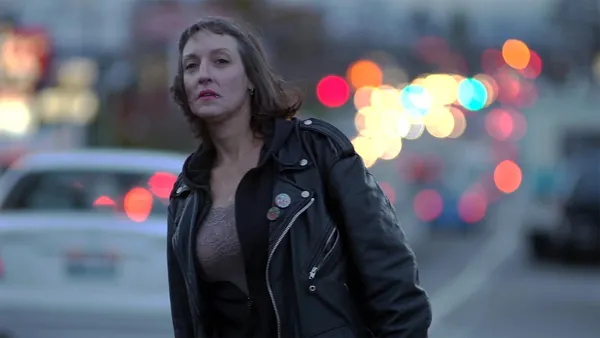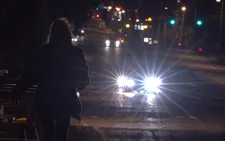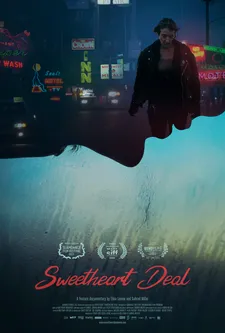 |
| Sweetheart Deal |
One of the standout documentaries at Slamdance 2023, Sweetheart Deal began life as an observational study of sex workers plying their trade on Aurora Avenue in Seattle, and also took in their interactions with Laughn ‘Elliot’ Doescher, a man living in an RV on the avenue who offered them food, shelter and other forms of support. It turned into something very different when information emerged about Elliot which nobody was prepared for, leaving the filmmakers and their other participants in a state of shock. In the run-up to the screening, I arranged to speak with codirector Elisa Levine.
The film opens with a scene which shows Elliot feeding pigeons. All of a sudden, he scoops one of them up off the ground. “If you hold ‘em right they don’t usually struggle too much,” he says. It’s a scene which is a little creepy at the time, but which takes on a whole new layer of meaning later. I began our chat by asking Elise when it was filmed and how much she knew at the time.
“At the time that we filmed that, that was pretty early, and we had no idea what was going to happen,” she says. “We also had no idea how much the theme was birds, and everything started to emerge more in the edit. But certainly that scene that you see later with the pigeon, with him talking to the pigeon, just watching that it was kind of like ‘Do you have any idea how you're coming off?’ We didn't know what was going to happen with him. But still, there was this thing about possession and control, and do you really want people to get better or is this about something else for you? And he's making this – I don't know what he was aware of or not – but he's making this impassioned speech to Freddie the pigeon. And we definitely found that fascinating.”
We discuss his uncanny ability to send all the wrong signals, and she asks me when I first began to feel that there might be something seriously problematic about him. I tell her that it was complicated because he seems creepy early on, but I wondered if that was just due to a lack of social skills on his part. I would have been wary of him, but I can see how, to addicts working on the streets, he might seem so much nicer than most of the men they meet that his creepiness is not a big deal. That’s in addition to the fact that it’s harder to pick up on little details that are off when exhausted and under the influence.
“There's that,” says Elisa, and adds that, although she too could see that creepiness, she easily warmed to him. “We liked him, you know? We found him eccentric, and we had this way – and I think that this worked the same way on the women to us – he had this way of being very disarming, because it was kind of like, ‘Yeah, I like sex, but I would never compel anyone, I never want anyone to feel uncomfortable, and everyone's always welcome to be here.’ He would just make you relaxed with humour injected into everything, so I was not afraid of him at all. I don't think anybody was feeling fearful of him or anything like that. Overall, our impression was ‘Yeah, he's not perfect, but his intentions are overall not bad, especially for what's out there on the street, what the options are.’”
 |
| Sweetheart Deal |
His openness makes it seem as if, if there were anything else he wanted, he’d just ask for it. I explain that this left me wondering if it were transgression for the sake of transgression which appealed to him.
“Yeah, and if there was any kind of deal that was going on that, we weren't privy to it,” she says. “We were kind of figuring things out as we went, but what he ended up doing, we’ve certainly not heard of any kind of agreement that anyone knew about, that was acceptable. And he knew that. To the end, he remained in denial about any kind of culpability, and he feels like he was the one wronged. So it's an interesting psychology, I guess. I mean, you're also dealing with life on the streets, which has its own set of rules, but what he did, even on the streets, was just completely not acceptable for anyone.”
I ask how she felt when she first found out, having worked with him for all that time and liked him. How did she go on filming with him afterwards? How did she deal with that on a personal level?
“When we learned that he was arrested, it was extremely disturbing,” she says, explaining that she first got the news from a Google alert. “We continued to try to have some kind of connection so we could keep up with what he was doing and try to gain access to the courtroom stuff. It wasn't very easy to stay in touch with him, but the only filming that we did after that was in the courtroom. And then also we recorded a couple of the calls that you hear as voiceover. We recorded one from jail and one from prison, and even getting the access to do that was ridiculously hard. But yeah, I did visit him in prison and just was in awe of his sense of denial about everything. I just kind of let him talk. But now he's back out. It’s a little bit crazy.”
We both stop and take a breath.
“When I first learned about what happened, it was just so weird,” she goes on. “It's not like we thought this guy's an angel, by any means, by that point, but it was still a sense of loss. He had been a part of our everyday lives for a long time, and it was really gross to read police reports and everything like that and learn all this stuff.”
I tell her that I’m impressed that she managed to stay in touch with the women in the film for as long as she did, given how chaotic life on the street can be, and she nods.
“It was good. This was primarily the group that we follow the most because it was, during certain times, very hard to keep up with people, especially if they maybe have lost their cell phones or weren't getting back to us and things like that. But overall, we always found a way to reconnect. And by the end of the film, everybody has gotten off the streets in one way or another.”
In one case, sadly, that’s in a way nobody wanted, and we pause to acknowledge the situation before she continues.
“We did maintain contact and maintain those connections, because those were the most important thing. You know, right now, Krista, who was Amy earlier in the film, she's doing fantastic. She's been coming with us to screenings sometimes and she's working full time as a graphic designerThe addiction, the draw, the challenge is always there. But she's doing okay, she's doing remarkably well. I'm probably going to be asking for her for a job soon!” She laughs. “I talk to her about interviews, she gives me interview advice, because I need to go get myself a job. So it's just remarkable that she's doing that well, you know, because that's not the usual trajectory, how these things go.”
 |
| Sweetheart Deal poster |
I tell her that I don’t think the film follows the usual trajectory either, and that I like the fact that it presents the women not simply as victims but as rounded individuals, intelligent people with professional skills who just happen to be in a vulnerable situation.
“Somebody phrased it really well the other day,” she says, frustrated because shec can’t remember who it was. “Somebody who is a friend of the film said the difference with this film is like we had this shared humanity with the women, and the addiction is secondary. Addiction is something that comes in, but that's not their identity.
“Our goal was really this: to let other people experience these women as we were experiencing them, to see – even if you're not in the you know, if your life is has never gone down this specific path – there's still points of connection here with everyday struggles. And there’s this humongous battle that they're fighting. They really want to get out of this world. You see these continued efforts to try to leave, whether or not those are successful.”
I also like the very plain, non-judgemental approach to addiction in the film.
“We just wanted to be very real,” she says. “We didn't have an agenda. We really didn't know where it was going to go. The primary thing was to tell the human story...this is not an easy issue to solve.”
Does she think that's part of the reason why she was able to connect with the women in the first place in the way that she did?
“I think so. Because the way they would talk about all these things, I don't know – I feel like a lot of films that come out, a lot of projects, it feels like it's been run through like 30 board meetings before it gets seen, making sure that all the language is correct and everything like that. And that's not how people talk on the streets. It's not how they talk about themselves – they're not even aware of all that. You know, I never heard them once use the term sex worker or anything like that. We were just really straightforward and we had this really natural connection. I think that they could see that we were interested in showing who they really were, and that we felt like we were learning something from them. And we also talked to them about our own struggles, you know, so there was this kind of shared connection, there was this very close connection.
“We never imagined that the people that we ended up meeting would be this remarkable, and how important these relationships would become in our lives. I think about them every day.”
I ask if she had any preconceptions which changed as a result of making the film.
“Yeah,” she says. “I feel like I had no clue. And, you know, I was not completely naive, but I was fairly naive about some things. I didn't even realise that most of the people out there, at least at the time in that area, were out there because of addiction, so I feel like I've learned so much. I just feel really lucky that they accepted us, you know? That was really meaningful to us.”





















